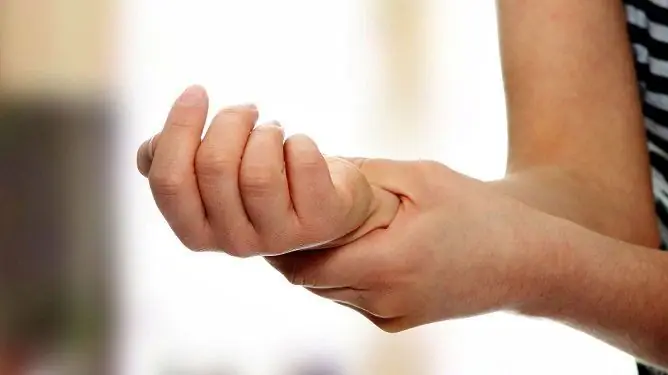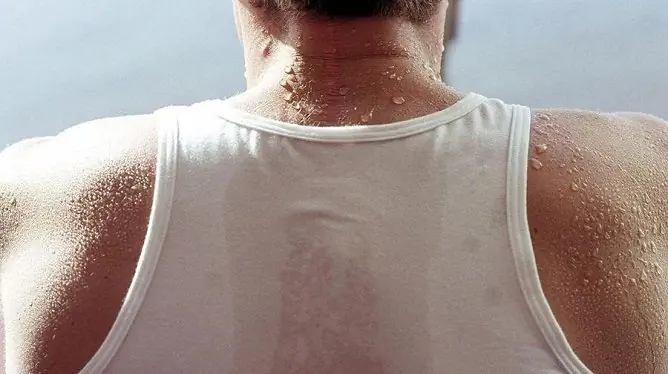- Author Rachel Wainwright wainwright@abchealthonline.com.
- Public 2024-01-15 19:51.
- Last modified 2025-11-02 20:14.
The child sweats a lot: causes and treatment
The content of the article:
-
The reasons
- Physiological causes
- Other causes of sweating
- Why does the sour smell of sweat appear?
-
Primary hyperhidrosis
Causes of primary hyperhidrosis
-
Sweating treatment
- How to make baths
- Which doctor to contact
- Video
The child sweats a lot for reasons that can be associated with many factors. But in most cases, sweating does not indicate a serious problem in the body, and over time it disappears without special treatment.

Excessive sweating occurs in many children
Many parents pay attention to the fact that their baby sweats a lot. This is especially pronounced during sleep. When faced with a problem such as increased sweating (hyperhidrosis), they begin to panic and assume the presence of disease. Why does the child sweat so much?
The reasons
Physiological causes
Sweating is a natural process primarily responsible for thermoregulation. If the ambient temperature rises, then in order to avoid overheating, the body begins to actively excrete sweat. Various toxins are also released along with sweat.

Often the child sweats a lot due to overheating due to improper clothing
According to the famous pediatrician Dr. Komarovsky, sweating in an infant is often a consequence of overheating of the body. Immediately after birth, the sweat glands begin to work actively. Already three weeks after birth, the baby reacts to the ambient temperature and produces sweat.
But at the same time, the immaturity of the nervous system affects the work of the sweat glands. They may overreact. Children from 2 months to 5 years old are considered the most sensitive to temperature fluctuations. After 6 years, the body is rebuilt and ceases to react so violently to heat.

Excessive sweating is easiest to notice when a child is sleeping
Noticing drops of sweat on a baby's body while awake is not as easy as it is while sleeping. The baby is actively moving, so the liquid evaporates faster. During sleep, the thermoregulatory mechanism works as usual, and produces the same amount of sweat as at other times. But since the child practically does not move, the liquid does not have time to evaporate, but accumulates on the body of the newborn, and this is especially noticeable in the head area.
The most common cause of sweating in children under 4 is inappropriate clothing. Caring parents try to keep the baby warm, dress him too tightly, covering him with an extra warm blanket. Accordingly, the body reacts to elevated temperatures and secretes sweat in order to cool the body.

In some cases, sweating occurs during feeding
Sometimes the baby sweats a lot during breastfeeding. This is due to the fact that the baby is actively breastfeeding. Increased exercise leads to increased sweating. The baby sweats especially a lot if the mother has little milk and the baby has to make serious efforts.
Other causes of sweating
In some cases, sweating in a child can be caused by the following pathologies:
- infectious diseases: ARVI, flu, tonsillitis, malaria;
- diseases of the nervous system: epilepsy;
- birth injuries: possible damage to the brain or spinal cord;
- endocrine system diseases: diabetes mellitus.
Why does the sour smell of sweat appear?
Sometimes parents pay attention to the fact that the sweat of a healthy child acquires an unpleasant sour smell. Why is this happening? The sweat that is secreted by the body does not have a pronounced odor. But at the same time, it is a breeding ground for bacteria to multiply. It is these microorganisms that give rise to the characteristic odor.
Another reason for the sour smell of sweat can be rickets. This is a serious and dangerous disease that develops as a result of a lack of vitamin D in the body. Children born in the autumn-spring period, when the body lacks sunlight, are especially susceptible to this disease.
Most often, the disease occurs in children of the first year of life. The main symptom of the disease is sweating, especially at night. In this case, the smell of sweat acquires a pronounced sour tint. Other signs of the disease include restless sleep, the baby often tosses and turns his head, which leads to occipital baldness.

For the prevention of rickets, vitamin D3 is indicated
For the prevention of rickets, children are prescribed an aqueous solution of vitamin D3. In order for the child to actively grow and develop, the remedy must be given to the baby every day. Before starting use, you should consult a pediatrician.
Primary hyperhidrosis
Sometimes hyperhidrosis in a child can occur in the absence of pathologies, which are accompanied by the active work of the sweat glands. If it is difficult, the baby's body not only becomes wet, but becomes covered with large drops of sweat.

To diagnose primary hyperhidrosis, you need to see a doctor
In this case, primary hyperhidrosis can be diagnosed. Sometimes it proceeds paroxysmal, but more often it is observed constantly. Sweating attacks occur at normal ambient temperatures in a well-ventilated area.
The main reason for such sweating is the increased excitability of the sympathetic part of the nervous system. The active production of the secretion of the sweat glands is stimulated by many nerve impulses that pass along the sympathetic trunks.
Causes of primary hyperhidrosis
Most often, such sweating is inherited by the baby. It can be observed in blood relatives, so if a child sweats a lot at 3 years old, you need to pay attention to his parents.
Sweating treatment
In order to get rid of sweating in young children, the following conditions must be met:
| Measures | Description |
| Dress your baby for the weather | It is necessary to give preference to clothing made from natural fabrics |
| Maintain optimal temperature conditions in the room | The air temperature in the room where the child walks and sleeps should not exceed 20 ° C. Ventilate the room regularly and, if necessary, use a humidifier |
| Carefully care for the baby's skin | You need to regularly bathe your baby and examine his skin |
| Organize proper nutrition | You should limit the consumption of sweet, salty, sour and spicy. The diet should contain foods rich in calcium and vitamin D |
| Monitor your baby's health | It is important to improve immunity and treat all diseases in a timely manner, preventing them from becoming chronic |
How to make baths
In order to reduce sweating, you can do baths:
- recipe number 1: pour one tablespoon of oak bark with three liters of water and boil over low heat, filter and use for bathing the baby. This broth can be used if the child's legs are sweating a lot;
- recipe number 2: add sea salt without additives to the baby's bath with water. The procedure is carried out once a week;
- recipe number 3: pour 2 tablespoons of willow bark with two liters of cold water and leave for 6-8 hours. Then the product is filtered and added to the bathing water.

Baths are an effective way to control the symptoms of hyperhidrosis.
Which doctor to contact
Initially, you need to tell the pediatrician about the existing problem. After examining and collecting anamnesis, he will decide whether there is a need for an examination and additional consultation with specialized specialists.
Video
We offer for viewing a video on the topic of the article.

Anna Kozlova Medical journalist About the author
Education: Rostov State Medical University, specialty "General Medicine".
Found a mistake in the text? Select it and press Ctrl + Enter.






